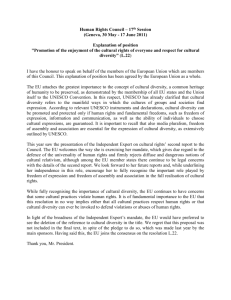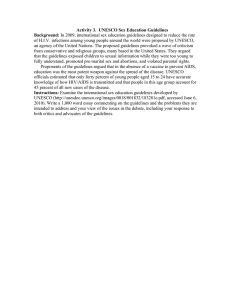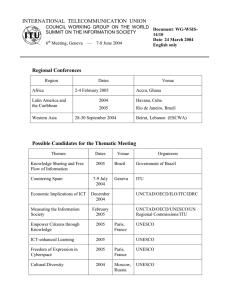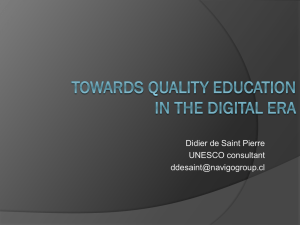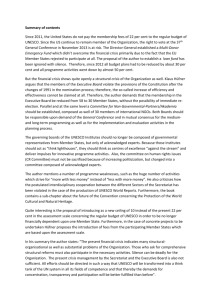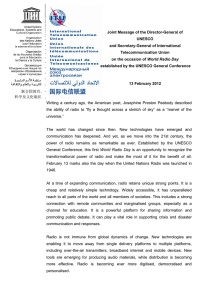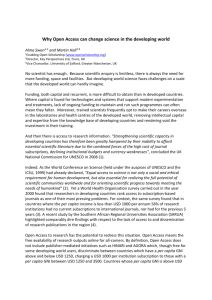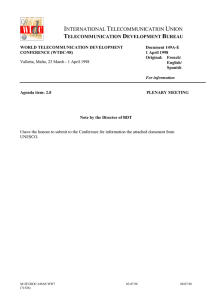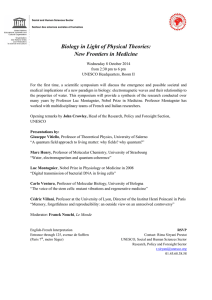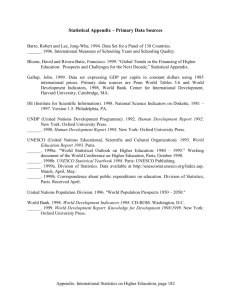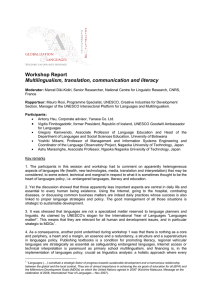Final Communique Basic Sciences Round Table
advertisement
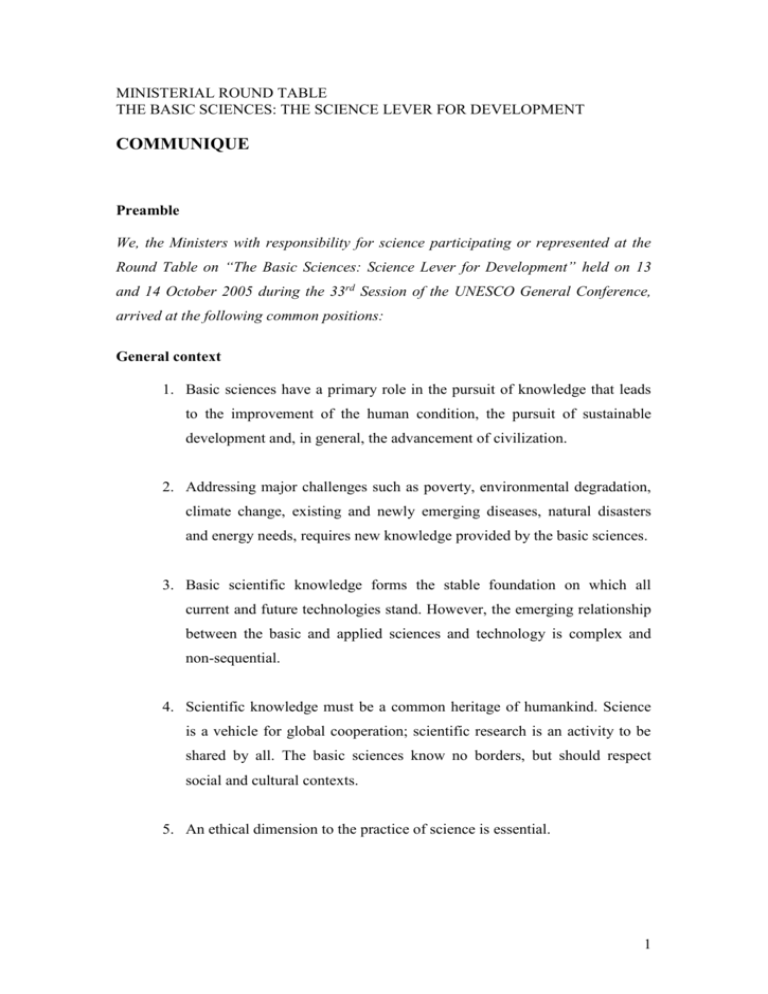
MINISTERIAL ROUND TABLE THE BASIC SCIENCES: THE SCIENCE LEVER FOR DEVELOPMENT COMMUNIQUE Preamble We, the Ministers with responsibility for science participating or represented at the Round Table on “The Basic Sciences: Science Lever for Development” held on 13 and 14 October 2005 during the 33rd Session of the UNESCO General Conference, arrived at the following common positions: General context 1. Basic sciences have a primary role in the pursuit of knowledge that leads to the improvement of the human condition, the pursuit of sustainable development and, in general, the advancement of civilization. 2. Addressing major challenges such as poverty, environmental degradation, climate change, existing and newly emerging diseases, natural disasters and energy needs, requires new knowledge provided by the basic sciences. 3. Basic scientific knowledge forms the stable foundation on which all current and future technologies stand. However, the emerging relationship between the basic and applied sciences and technology is complex and non-sequential. 4. Scientific knowledge must be a common heritage of humankind. Science is a vehicle for global cooperation; scientific research is an activity to be shared by all. The basic sciences know no borders, but should respect social and cultural contexts. 5. An ethical dimension to the practice of science is essential. 1 6. In the governmental decision-making process, scientific information, data and expertise in the area concerned should be duly taken into account. Education in science 7. Effective pursuit of the basic sciences ultimately depends upon science education that inspires students at all levels – pre-primary, primary, secondary and tertiary – as well as in the informal and non-formal environments. 8. Greater emphasis should be given to science education as an integral part of capacity building, in particular quality assurance, the sharing of human resources (researchers and science educators), and more flexible, broadbased PhD programmes. 9. Innovative means should be developed in order to allow young people to appreciate the value, creativity, challenges and excitement of science, to become positive players, as concerned citizens, in the advancement of human development. 10. Science should be de-mystified and popularised at all levels. 11. There is a symbiotic relationship between scientific research and higher education that should be fostered. 12. Universities and research institutes are the pivotal institutions in securing the development of the basic sciences; they provide main human resources, serve as generators of ideas and concentrate much of the crucial infrastructure. 13. There is a need for well organized, non-formal education programmes for the popularization of science in the community; the public media and the universities can play an important role. 2 Capacity building 14. An essential way to achieve the development goals agreed by Member States in the Millennium Declaration is through the effective application of science and technology. The international community should give greater attention to capacity building in basic sciences as the platform for knowledge-based development. 15. ICT capacities should be enhanced as enablers of global inclusion and equality of participation in science and technology; hence ICTs should be used for bridging the digital divide, enabling distance learning, electronic access to scientific textbooks and journals, creating new contents with added value, and providing the means for a quantum leap forward in socioeconomic development. 16. Capacity building should be enhanced through the sharing of best practices. 17. International support for capacity building, education, teacher training, research and innovation in the basic sciences should be promoted. 18. Least developed countries, and countries in post-disaster and post-conflict situations, especially those in Africa, should be assisted through flexible mechanisms for S&T development. 19. Investment in research areas of the basic sciences should be driven by national and regional priorities. 20. Promotion of science requires the establishment of incentives, opportunities and the appropriate environment. 3 21. There is need for the creation of an enabling environment to alleviate brain drain, foster cooperation and the mobility of academic staff, and make better use of diasporic researchers. 22. Gender parity and equal opportunity in the basic sciences should be promoted, including equal participation in science decision-making at all levels, and through the involvement of new capacities and talents. Cooperation 23. Member States should seek to benefit from regional, interregional (NorthSouth, South-South) and global transdisciplinary cooperation in the basic sciences. The basic sciences themselves would be enriched by such cooperation on global problems and socially relevant issues. 24. Public-private partnerships, and cooperation with civil society, including NGOs, should be promoted and enhanced in support of education, science, innovation and research. 25. A pivotal role should be played by regional centres and networks of excellence in advancing the knowledge, understanding and application of science, within the framework of regional and subregional structures. Role of UNESCO 26. In the light of the above, we call upon UNESCO to consider the following: (a) to place greater emphasis on promoting the basic sciences and science education with a view to the attainment of a science culture as a precursor of a knowledge-based society worldwide, through various means available at UNESCO, and in particular the recently launched flagship International Basic Sciences Programme (IBSP). 4 (b) to develop and promote a clear programme of action for youth and for gender parity. (c) to emphasize science education as an integral part of capacity-building by developing model curricula in science for secondary and undergraduate teaching suited to the emerging knowledge economy. (d) to strengthen existing UNESCO Chairs and centres of excellence in the basic sciences in both developed and developing countries, to foster networking between them for the benefit of developing countries, and to promote in this context cooperation with regional structures such as NEPAD in Africa. (e) to assist the upgrading of higher education in developing countries through feasibility studies to transform academic institutions/universities into academic/research institutes, and vice versa. (f) to seek stronger synergies between the basic sciences and higher education through intersectoral programmes. (g) to assist in the formulation, implementation and mainstreaming of foresight, prioritization and science and technology policies in developing countries, and the establishment of innovation systems, bearing in mind the importance of S&T policies to facilitate national economic growth and development. (h) to promote the mobility of teachers and researchers in science and technology, in particular from developing countries, and especially those from the diaspora. (i) to promote the training of scientists from developing countries to help them to negotiate with donors and other development partners. 5 (j) to continue to promote an ethical dimension to the practice of science. (k) to play a proactive role in promoting an equitable access to scientific information and literature for scientists and researchers, particularly from developing countries. (l) to help to seek and foster partnership and coordination across the UN system, and with other international organizations. 6
